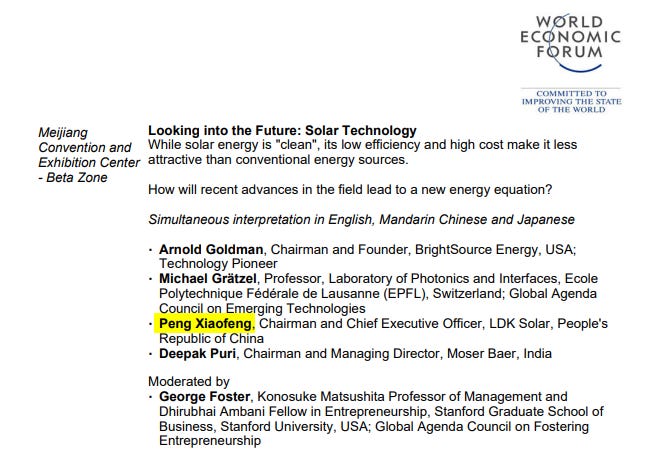On January 18, President Trump posted a video to his account on Truth Social. He described the need for “aggressive new restrictions” on Chinese ownership of United States’ infrastructure. He said in the video at [1:05]:
“While some are focused on China's purchases near power plants and military bases, the fact is we should be very concerned about all Chinese Communist activity in the United States. As I’ve long said, economic security is national security. China does not allow American companies to take over their critical infrastructure and America should not allow China to take over our critical infrastructure… To protect our country, we need to enact aggressive new restrictions on Chinese ownership of any vital infrastructure in the United States, including energy, technology, telecommunications, farmland, natural resources, medical supplies and other strategic national assets."
» I've put together a list of about 65 news articles in a separate Substack for reference.
At least 15 states, thousands of houses seized, billions of dollars in cash and product, "AR-style" firearms, money laundering, human trafficking, and murder. What do EVERY SINGLE ONE of these news articles have in common? Chinese-nationals actively engaged in the illicit marijuana trade. As you’ll see throughout this article, Chinese-funded infiltration is not limited to America’s critical infrastructure.
One World Ventures and SPI Energy
In March 2019, One World Ventures Inc. "announced the appointment of Dineh Benally to its Board of Directors, who currently serves as President of the Navajo Nation San Juan River Farm Board (the ''Board'') and President of the Native American Agricultural Company (NAAC)"1
In a 2022 SEC filing, One World Ventures Inc (OWVI) stated "Our goal is to become a cryptocurrency datacenter hosting company for cryptocurrency miners that will utilize technologies, beneficial environmental factors and low-cost electricity to host cryptocurrency miners."2 OWVI was led by Damu Lin (aka Da Mu Lin).
Dineh Benally also teamed up with SPI Energy Co. SPI reorganized as an offshore Cayman Islands company in 2015. The head of SPI is Xiaofeng "Denton" Peng, once the richest man in the province of Jiangxi China. In 2018, Xiaofeng was considered a fugitive from China, accused of "illegally absorbing public deposits" with previous ventures LDK Solar and Solarbao.
Xiaofeng Peng was involved with the World Economic Forum, and gave a presentation in 2010 called "Looking into the Future: Solar Technology"
This venture between the Native American Agricultural Company, One World Ventures, and SPI Energy, touted the many uses of “legal” hemp, including fuels, textiles, and medicine. The Southwest was seen as a prime spot for its cultivation. They were excited to “build and develop cannabis businesses on Tribal land.”
It didn't take long for things to go bad in Navajo Nation, specifically Shiprock, New Mexico.
“scores of foreign workers – an estimated 1,000 people, many of them Chinese immigrants brought to New Mexico from Los Angeles”
“Some of the Chinese carry guns”
“So alarming are the operations in Shiprock that the FBI, the New Mexico Attorney General’s Office, the U.S. Attorney’s Office, the Department of Homeland Security, Navajo Nation Police and the San Juan County Sheriff’s Office have joined forces to investigate”3
“On Sept. 18 [2020], a Navajo court issued a temporary restraining order requiring Benally to halt all operations on his farms.”
Irving Rea-Yui Lin
One of Benally's business associates in the Shiprock venture was Irving Lin, a Los Angeles-based real estate agent. “We’ve lost minimum $20 million” because of the restraining order, Irving Lin said, explaining that he and his partners had built almost 1,000 greenhouses at $10,000 apiece, and invested $10 million in farm infrastructure.”4
Irving had come to the United States in the late 1970's and had an entrepreneurial spirit. He started a computer business in Jackson Heights, New York in the late 1990's called ABEST International Inc. It was a multi-million dollar business by the time he sold the communication division to Tianrong Internet Products and Services, Inc in 2000. A little diversion is necessary here. In 2000, the same year Tianrong bought the communication division of ABEST, it also partnered with CC&T Technologies and Lionel Ni for its telecommunications hub. Both ABEST and CC&T were housed at 60 Hudson Street in New York City. Both companies were involved in Voice Over Internet (VoIP) technology and equipment, routers, hubs, servers and switches. While these facts aren't directly related to this article, I find it more than coincidental that Konnech-related digs have early connections in this marijuana-dig.
Undeterred by his multi-million dollar losses in New Mexico, Irving Rea-Yui Lin (林瑞煜) gave at least 2 presentations at Chinese cultural centers in the Los Angeles, California area in December 2020. Support for medical marijuana is growing in Oklahoma! You can become a millionaire, he told his audience.
“Oklahoma, it's like a heaven there,” said Bryan Peng, a Los Angeles-based marijuana farm manager whose grow site in New Mexico was shut down by the federal raid in November. “The sky is the limit. We can take it to the next level.”5
Wanna dig? Here are a few resources:
Oklahoma Secretary of State
Oklahoma Medical Marijuana Authority
Oklahoma Tax Rolls by county
Here is where things get tricky. Over the next 2 years in Oklahoma, thousands of shell corporations were created. Thousands of homes and countless acres of farm land were purchased. Oklahoma became a magnet for Chinese-nationals. Those higher up on the hierarchy were real estate agents and purchased residential houses and farm land. Many of these people were from out-of-state, often Brooklyn and Flushing, New York. Middle-men obtained thousands of Medical Marijuana licenses connected to these corporations. One such person was Kevin Pham, who was the registered agent for at least 275 Oklahoma corporations.
Other Chinese-nationals were victims of human trafficking and housed at these locations to “cut buds”. They claimed to not know what they were doing was illegal. They also claimed to speak very specific Chinese dialects and required hard-to-locate translators. Thousands of workers from the failed Shiprock enterprise were relocated to Oklahoma.
One such worker was Wei Wen. She was caught up in a raid in New Mexico in 2020. Local New Mexico victim advocates applied for compensation for 21 workers from the raids. Wei was appreciative, telling VOA Mandarin: "We're all right now. We got the travel expenses covered as well as the pay for working on the farms. New Mexico is good. New Mexico government is good. We thank them".6 She was planning to move to Oklahoma and hoped to find work watering and raising seedlings in Feb or Mar of 2021.
In December 2022, Wu Chen, a Chinese-national, was accused of killing 4 people and injuring another on an illegal marijuana farm in Kingfisher County, Oklahoma. Wu Chen was later apprehended in Miami, Florida and begged the Miami-Dade Circuit Judge to "stop his extradition to Oklahoma." "I want to stay here whatever how long I have to stay in jail I don’t care. But if I go back to Oklahoma I’ll be killed in the prison or jail ... I’m afraid I will be killed because these people are mafiosos."7 His request to remain in Florida was not granted.
California, Colorado, Massachusetts, Michigan, Oregon, Washington... A Chinese real estate business buys up homes/land with funding directly from China, shell corporations are created, medical marijuana licenses are applied for. In the words of Chinese investor "Anna Ho" "To apply for legal licenses for my business is what I focus on right now,” she said, sitting in a boba tea shop in Oklahoma City’s Asian District."8
In a 2018 California case, U.S. Attorney McGregor Scott "explained that criminals in China’s Fujian Province wired more than $6.3 million to accomplices living in the United States. Scott said the funders typically wired less than $50,000 each in order to work under Chinese regulations on overseas wire transfers."9
In many of the cases across the country, the marijuana is not being grown in greenhouses on vast farmland, as they were in New Mexico and Oklahoma. Nope, residential homes, often in picturesque sub-developments, are being converted to "grow homes". Oftentimes, nobody even lives in the houses. They’re converted into elaborate grow operations, with specialized lighting, watering, and ventilation systems. Sometimes, the electricity is bypassed to avoid detection. Mold developed in many of the houses, rendering them unfit for future habitation.







I work in the cannabis industry and the legal growers are suffering from high taxation and ruinous competition. Many have bankrupted. Why can't we remove foreigners who don't pay taxes and are not legal and allow US citizens to benefit from canna profits? Can't wait for this whole degraded economy to reset for the people.
My concern, is the cannabis being grown and harvested by foreigners making its way to the legal cannabis market?